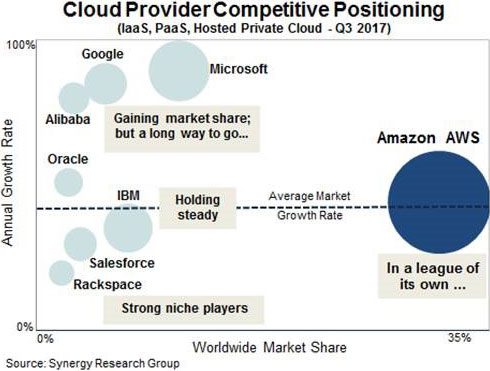Amazon, already an online retailing behemoth, can also take credit for revolutionizing the way businesses acquire and pay for their IT resources nowadays. Amazon Web Services (AWS), Amazon’s cloud computing unit, remains the cloud vendor to beat, in spite of growing competition from major rivals in recent years.
The market for cloud computing solutions continues to expand at a rate of 40 percent per year, according to the latest data from Synergy Research Group. Each quarter, the cloud infrastructure service market, which includes IaaS (infrastructure-as-a-service), PaaS (platform-as-a-service) and hosted private clouds) clears 12 billion in worldwide sales, according to the analyst group.
Protecting your company’s data is critical. Cloud storage with automated backup is scalable, flexible and provides peace of mind. Cobalt Iron’s enterprise-grade backup and recovery solution is known for its hands-free automation and reliability, at a lower cost. Cloud backup that just works.
In the meantime, Microsoft, Google and Alibaba are making big gains, but even these heavy hitters are having a tough time trying to chip away at Amazon’s hold on the market.
“Microsoft, Google and Alibaba all continue to grow at truly impressive rates, but you have to feel a bit sorry for them as market leader AWS continues to nudge up its market share despite them,” said John Dinsdale, chief analyst and research director at Synergy Research Group, in a research note sent to Datamation. “It remains almost three times the size of its nearest rival and larger than its next five competitors combined. The cloud market is continuing to consolidate around a small group of hyperscale cloud providers.”

IBM’s leadership in the hosted private cloud services segment has helped the venerable IT company maintain its third-place position, behind Microsoft and ahead of Google. Oracle’s cloud pivot is showing results, noted Synergy. Salesforce and Rackspace, although niche players, help round out top eight.
And the market has nowhere to go but up.
Gartner recently predicted that the public cloud services will surpass the $400 billion mark in 2020, compared to an estimated $260.2 billion this year. Much of that growth will be driven by businesses turning to SaaS (software-as-a-service) solutions.
“SaaS [software as a service] revenue is expected to grow 21 percent in 2017 to reach $58.6 billion. The acceleration in SaaS adoption can be explained by providers delivering nearly all application functional extensions and add-ons as a service,” stated the IT market analyst group. “This appeals to users because SaaS solutions are engineered to be more purpose-built and are delivering better business outcomes than traditional software is.”
Pedro Hernandez is a contributing editor at Datamation. Follow him on Twitter
Huawei’s AI Update: Things Are Moving Faster Than We Think
FEATURE | By Rob Enderle,
December 04, 2020
Keeping Machine Learning Algorithms Honest in the ‘Ethics-First’ Era
ARTIFICIAL INTELLIGENCE | By Guest Author,
November 18, 2020
Key Trends in Chatbots and RPA
FEATURE | By Guest Author,
November 10, 2020
FEATURE | By Samuel Greengard,
November 05, 2020
ARTIFICIAL INTELLIGENCE | By Guest Author,
November 02, 2020
How Intel’s Work With Autonomous Cars Could Redefine General Purpose AI
ARTIFICIAL INTELLIGENCE | By Rob Enderle,
October 29, 2020
Dell Technologies World: Weaving Together Human And Machine Interaction For AI And Robotics
ARTIFICIAL INTELLIGENCE | By Rob Enderle,
October 23, 2020
The Super Moderator, or How IBM Project Debater Could Save Social Media
FEATURE | By Rob Enderle,
October 16, 2020
FEATURE | By Cynthia Harvey,
October 07, 2020
ARTIFICIAL INTELLIGENCE | By Guest Author,
October 05, 2020
CIOs Discuss the Promise of AI and Data Science
FEATURE | By Guest Author,
September 25, 2020
Microsoft Is Building An AI Product That Could Predict The Future
FEATURE | By Rob Enderle,
September 25, 2020
Top 10 Machine Learning Companies 2020
FEATURE | By Cynthia Harvey,
September 22, 2020
NVIDIA and ARM: Massively Changing The AI Landscape
ARTIFICIAL INTELLIGENCE | By Rob Enderle,
September 18, 2020
Continuous Intelligence: Expert Discussion [Video and Podcast]
ARTIFICIAL INTELLIGENCE | By James Maguire,
September 14, 2020
Artificial Intelligence: Governance and Ethics [Video]
ARTIFICIAL INTELLIGENCE | By James Maguire,
September 13, 2020
IBM Watson At The US Open: Showcasing The Power Of A Mature Enterprise-Class AI
FEATURE | By Rob Enderle,
September 11, 2020
Artificial Intelligence: Perception vs. Reality
FEATURE | By James Maguire,
September 09, 2020
Anticipating The Coming Wave Of AI Enhanced PCs
FEATURE | By Rob Enderle,
September 05, 2020
The Critical Nature Of IBM’s NLP (Natural Language Processing) Effort
ARTIFICIAL INTELLIGENCE | By Rob Enderle,
August 14, 2020

Datamation is the leading industry resource for B2B data professionals and technology buyers. Datamation's focus is on providing insight into the latest trends and innovation in AI, data security, big data, and more, along with in-depth product recommendations and comparisons. More than 1.7M users gain insight and guidance from Datamation every year.
Advertise with TechnologyAdvice on Datamation and our other data and technology-focused platforms.
Advertise with Us
Property of TechnologyAdvice.
© 2025 TechnologyAdvice. All Rights Reserved
Advertiser Disclosure: Some of the products that appear on this
site are from companies from which TechnologyAdvice receives
compensation. This compensation may impact how and where products
appear on this site including, for example, the order in which
they appear. TechnologyAdvice does not include all companies
or all types of products available in the marketplace.